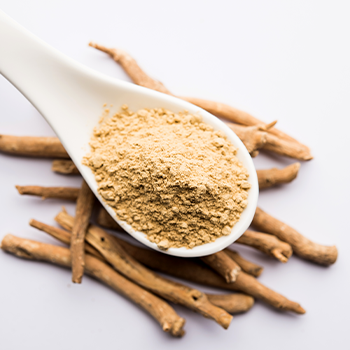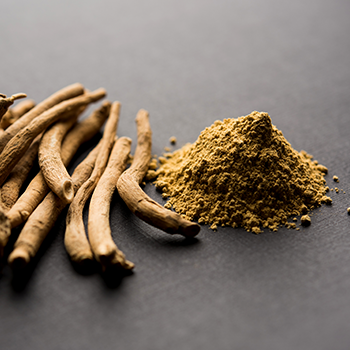The potential benefits of ashwagandha make it a serious consideration for many fitness clients looking for natural ways to improve their mental and cognitive health.
The increasing trend of including ashwagandha in nootropic supplements prompted me to sit down with our nutritionists and take a deeper look at this fascinating Indian plant.
Curious about ashwagandha? Read on to learn more.
Quick Summary
- Ashwagandha is recognized as a nootropic, traditionally used in Indian medicine to enhance cognitive function and reduce stress.
- The two main forms of Ashwagandha found in supplements are KSM-66 and Sensoril, each offering unique benefits.
- Recent studies published in PubMed confirm Ashwagandha's nootropic benefits, echoing its long-standing use in Ayurvedic medicine.
- Personally, I find Ashwagandha to be an effective natural option for improving mental clarity and reducing stress.
Is Ashwagandha a Nootropic?

Ashwagandha is a nootropic in that it has nootropic-like properties, with many believing it improves cognitive function, reduces stress and anxiety, and enhances overall well-being.
From my experience, Ashwagandha truly lives up to its reputation as a nootropic, noticeably improving my cognitive function and reducing stress.
Recent scientific research published in PubMed confirms the nootropic benefit of ashwagandha that Ayurvedic medicine discovered thousands of years ago [1].
Ashwagandha stands out for its neuroprotective properties, offering a shield against cellular damage with its potent antioxidant capabilities, actively countering the detrimental effects of free radicals on brain health.
Let's take a closer look.
What is Ashwagandha?
Ashwagandha is a plant that has been around for centuries in Ayurvedic medicine, an Indian system of medicine that dates back more than 5,000 years, and is considered as an organic nootropic.
Interestingly, Indian ginseng is another term for ashwagandha, probably due to its rejuvenating properties, but it is not ginseng.
It is in the same family as the tomato, with yellow flowers and red fruit the size of a raisin.
Delving into the ethnobotanical roots of Ashwagandha, we find a rich tapestry of traditional uses across various cultures, where it has been revered not just for its physical benefits but also for its profound impact on cognitive health and mental well-being.
When reading supplement labels, you will likely come across two patented forms of ashwagandha, KSM-66 and Sensoril.
Let's briefly discuss the two.
KSM-66 vs. Sensoril

KSM-66 is a patented, specialized extract from the plant's root that closely matches raw ashwagandha. Having tried KSM-66 myself, I can attest to its effectiveness in mirroring the benefits of raw ashwagandha.
KSM-66 producers use a process they believe is in line with ancient Ayurvedic medicine by pre-treating the roots with milk, allowing them to get the highest purity [2].
Sensoril is a patented extract from both the root and the leaf of the ashwagandha plant and seems to have more calming effects that promote reduced stress and improved sleep quality and can improve cognitive function, according to the study published in PubMed Central [3].
“Ashwagandha supplements may improve memory, reaction time, and the ability to perform tasks in certain populations.”
- Jillian Kubala, M.S., R.D
How It Works in the Brain
Ashwagandha is a nootropic that helps with stress because it works in the brain by modulating the activity of the hypothalamic-pituitary-adrenal (HPA) axis.
In my coaching experience, I've seen Ashwagandha significantly reduce stress in clients by modulating their HPA axis activity.
The HPA axis regulates the body's stress response [4].
Additionally, ashwagandha appears to affect levels of cortisol, heat shock proteins (Hsp70), and c-Jun N-terminal protein kinase (JNK-1), which are all activated by stress, according to the Cureus [5].
Essentially controlling these responses to stress can help combat anxiety, depression, weight gain, fatigue, and many other health problems like high blood pressure [6].
Curious about the optimal dose? Read on.
How Much Should I Take?

Ashwagandha dosage typically ranges from 200 to 600 mg daily.
However, it's important to consult your healthcare provider before starting, particularly for those with existing health conditions, or if pregnant or breastfeeding.
For beginners, a lower dose is recommended to assess tolerance.
Related: When is the Best Time to Take Ashwagandha?
What is the Best Form of Ashwagandha?
In my coaching practice, I've observed that the best forms of ashwagandha are KSM-66 and Sensoril, both branded, organic, full-spectrum, and potent extracts offering the highest quality and possibly efficacy over generic brands.
However, ashwagandha comes in capsule, powder, and liquid form from countless manufacturers.
Potential Side Effects of Ashwagandha
Ashwagandha is usually well-tolerated by most healthy adults when taken in small to medium doses. Higher doses can lead to some adverse side effects, likely due to the irritation of the intestinal mucosa [7].
These side effects include:
- Nausea
- Vomiting
- Diarrhea
- Digestive upset
Related: Can Nootropics Cause Hair Loss?
FAQs
Is Ashwagandha a Nootropic or Adaptogen?
Ashwagandha is an adaptogen with nootropic-like properties. The plant can significantly impact your body's response to stress and has been doing such in Ayurvedic medicine for thousands of years.
Is Ashwagandha a Safe Nootropic?
Ashwagandha is a safe nootropic with potent adaptogenic effects when taken in small to medium doses. Larger doses can lead to some bothersome digestive issues. Pregnant and breastfeeding women should avoid ashwagandha.
References:
- https://pubmed.ncbi.nlm.nih.gov/26361721/
- https://ksm66ashwagandhaa.com/ksm-66/what-is-ksm-66/
- https://www.ncbi.nlm.nih.gov/pmc/articles/PMC3897003/
- https://www.ncbi.nlm.nih.gov/pmc/articles/PMC6750292/
- https://www.ncbi.nlm.nih.gov/pmc/articles/PMC6979308/
- https://www.webmd.com/a-to-z-guides/what-is-cortisol
- https://www.medicalnewstoday.com/articles/318407
About The Author
You May Also Like






